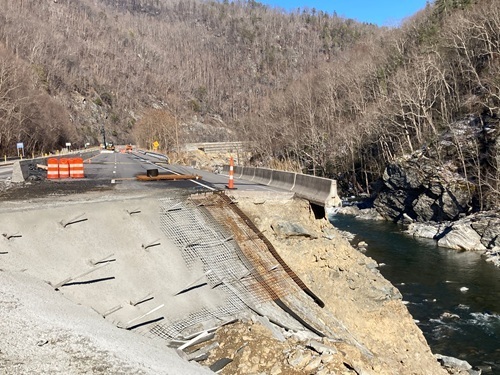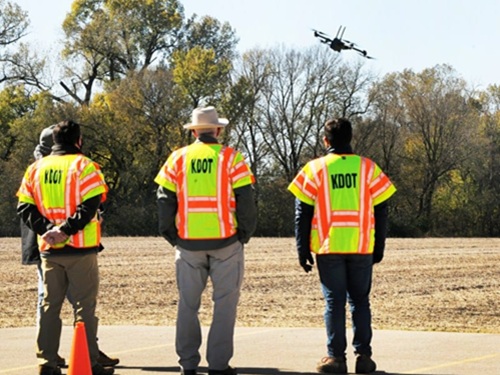Michigan and Ontario are collaborating on what they describe as a “first-of-its kind technology initiative” to create a “commercial drone skyway” between them, as well as in southeast Michigan and any other suitable location within Michigan’s borders.
[Above photo by Thales USA]
The Michigan Department of Transportation is one of several state agencies that will work with the Ontario Vehicle Innovation Network or OVNI to explore operating small drones beyond the line of sight of a pilot for just-in-time deliveries, medical transport needs, and other “small-scale” deployments.

Governor Gretchen Whitmer (D) added that several private sector firms – Detroit-based Airspace Link, Thales USA, the Northern Plains UAS Test Site, Aviation Innovations LLC, CityFi, and Grand Sky Development Co. LLC – plans to help Michigan and Ontario develop a “feasibility analysis” for those proposed commercial drone skyways.
“Cross-border partnership is critical across all dimensions of mobility, including aerial systems,” the governor noted in a statement. “Considering the density of auto suppliers, logistic companies, technology start-ups, and consumers in the region, it is a natural fit to test this cutting-edge aerial technology here. The vital research could lead to faster product deliveries and reduced supply chain disruptions in the future.”

“This unmanned aerial system joint venture with Ontario builds on the extensive work underway to make Michigan a global leader in the development and deployment of mobility technologies that will benefit society, protect the environment, and strengthen our economy,” said Paul Ajegba, Michigan DOT director.
“We look forward to demonstrating beyond visual line of sight commercial UAS operations are not only safe, efficient and feasible, but also that the technology can be employed to better connect the intermodal transportation system that many in Michigan rely upon,” he said.
[Editor’s note: Ajegba also recently provided an overview of the Michigan DOT’s many ongoing projects in a ‘2 Minute State DOT Update’ seen below produced by Transportation TV.]
Another key partner in two of the three proposed areas will be the Michigan Central mobility innovation district in the Corktown neighborhood of Detroit.
Their collaboration with key stakeholders from the state and city will help advance this research and innovation to a broader idea of autonomy that goes beyond vehicles on the road, but also the water or sky, according to Gov. Whitmer’s office.
In addition, such community-based outreach sets a precedent for how other partners exploring and testing in the Michigan Central impact area educates and conducts feedback from the residents, the governor’s office said.
The Airspace Link team also plans to provide an analysis of existing airspace, air traffic infrastructure, and ground infrastructure required to ensure operational safety of commercial drone skyway.

The analysis also will include the potential economic impacts, applicable state and local zoning restrictions, environmental factors – like social equity and noise considerations – as well as travel impacts plus connections to existing aviation, surface transportation, and transit modes.
The drone skyway partnership work Michigan and Ontario began in August 2021 to extend their longstanding collaboration on transportation and cross-border activities, with Michigan DOT and OVIN signing a memorandum of understanding to explore the implementation of a cross-border, multimodal testbed for advanced automotive and mobility solutions.
State departments of transportation are also involved in similar drone testing efforts in different parts of the country.

In December 2021, the aeronautics division of the Massachusetts Department of Transportation began collaborating with drone provider Skyports to demonstrate how drone services could link communities across the Cape Cod region.
MassDOT said it is investigating the uses of drones as a solution to connecting its remote communities to everyday services such as healthcare and logistics, and in particular is looking to develop a capability to provide emergency medical delivery after storms or other natural disasters.
In July 2021, the North Carolina Department of Transportation completed two successful trial flights of a delivery drone from Hatteras to Ocracoke Island.

NCDOT’s Division of Aviation, in partnership with the NCDOT Ferry Division and U.S.-based drone logistics company Volansi, conducted the two eight-mile round trips that averaged 18 minutes of drone flight time each.
The drones took off from the Hatteras Village ferry dock and landed at the South Dock on the north end of Ocracoke Island and – to simulate a real post-storm emergency delivery operation – both flights carried small payloads. The first delivered a small survival kit, space blankets and a chocolate muffin to Ocracoke, while the second delivered bottles of water, the agency said.
“This was just a small trial, but we hope to continue scaling this up to larger payloads and longer flights,” said Ben Spain, manager for NCDOT’s Unmanned Aerial Systems program. “Long-term, we could see deliveries coming to Ocracoke all the way from the mainland.”
 States
States
NCDOT to Rebuild I-40 with National Forest Rocks
June 27, 2025 States
States

